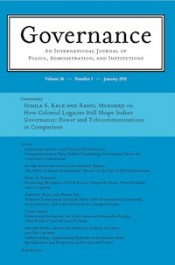Is Mahbubani too optimistic about Asia’s rise?
Last month, Governance published Francis Fukuyama’s commentary “What is governance?” On March 26 we posted a response from Kishore Mahbubani, Dean of the Lee Kwan Yew School at the National University of Singapore. Dean Mahbubani’s response was also published in the Singapore Straits Times. In this column, reprinted from the April 8 Straits Times, Sun Xi replies to Dean Mahbubani:
 PROFESSOR Kishore Mahbubani, dean of the Lee Kuan Yew School of Public Policy at the National University of Singapore, has been described as “the muse of the Asian century”. He is widely known for his famous idea, “the rise of Asia and the decline of the West”.
PROFESSOR Kishore Mahbubani, dean of the Lee Kuan Yew School of Public Policy at the National University of Singapore, has been described as “the muse of the Asian century”. He is widely known for his famous idea, “the rise of Asia and the decline of the West”.
His full perspectives on the idea can be intensively explored in his books - The New Asian Hemisphere: The Irresistible Shift Of Global Power To The East, and The Great Convergence: Asia, The West And The Logic Of One World.
As an Asian youth, I am actually very receptive to his idea of the rise of Asia, since it gives us an unprecedented dose of confidence in our future. However, Prof Mahbubani’s idea also casts a doubt in my mind: Is he too optimistic about Asia’s rise?
As a matter of fact, his argument is mainly based on the evidence that some of the major Asian emerging countries (China, India and Indonesia) have been enjoying rapid economic growth and relative success in recent decades. However, I question if Asia as a whole is also rising comprehensively and sustainably in terms of political, social and cultural power.
On March 26, The Governance journal blog published an article by Prof Mahbubani in response to American academic Francis Fukuyama’s essay, What Is Governance’. Prof Mahbubani welcomed Professor Fukuyama’s distinction between democracy and good governance, particularly in the Asian context. As I scrutinised Prof Mahbubani’s article, I started to wonder if he was too optimistic again.
Although Prof Mahbubani mentioned in his article that “democracy is a desirable goal”, his key arguments over-emphasised democracy as just a means of governance.
This is evident from his claim: “To put it bluntly, democracy is neither a necessary nor a sufficient condition for good governance. And, yes, it is possible to have good governance without democracy.”
Unfortunately, this point may be easily misunderstood by the public as: democracy is regarded as dispensable or optional, so long as there is good governance.
On the contrary, I want to re-emphasise that democracy is not only a means to governance, but also an extremely critical social development goal.
In its proclamation of Independence in 1965, Singapore proposed the blueprint of constructing a nation with democracy, independence, freedom, justice, fairness, equality, welfare and well-being.
Even the People’s Republic of China, which always firmly declares “building socialism with Chinese characteristics”, clearly states its national goal of “building a prosperous, democratic and civilised socialist country” in its Constitution. Therefore, it is very obvious that even if there is good governance, democracy is still an inevitable objective to pursue.
China was cited by Prof Mahbubani to support his idea. He commented in his article that “anyone who doubts this (it is possible to have good governance without democracy) should look at the record of China’s government over the past 30 years”.
As a mainland-born Chinese, I should be very proud if China’s so-called unique development model can be considered as a sustainable paradigm of good governance.
However, Prof Mahbubani’s statement raises a pertinent question: Why should we look only at the past 30 years of China’s governance but not the past 40 or even 50 years’
Obviously, China has been enjoying fast economic growth over the past 30 years since the opening up of its economy in the late 1970s. Nonetheless, China and its people suffered greatly during the Cultural Revolution from 1966 to 1976 and the earlier Great Leap Forward years (1958-1960).
What type of governance had existed in China during the 30 years between the establishment of the People’s Republic of China in 1949 and the opening up of the economy in 1978′
Yes, democracy may not necessarily ensure good governance, but in my view, it should at its minimum prevent the rise of “evil governance”.
In addition, Prof Mahbubani wrote that “no other society in human history has improved human welfare as much as the Chinese government”.
I personally agree but this judgment comes a bit too early.
It may not be reasonable to compare economic performance between developed countries and emerging countries simply in terms of the speed of growth as it is similar to comparing the growth rate between the elderly and the young.
Although the West is currently experiencing certain crises, isn’t it unfair to blame the Western model of democracy as a scapegoat? The United States has been prosperous for hundreds of years, with its democratic system as one element underpinning its success.
Perhaps China did not need democracy for the past 30 years during its initial phase of wealth creation. Nevertheless, without a functional democratic system in place in the near future to ensure equal participation from the public in the wealth allocation, China will not be able to build an inclusive society based on fairness, justice and less corruption.
Singapore is another example which Prof Mahbubani favours. His article stated: “The Singapore civil service has performed brilliantly but it has not done so because it is the most autonomous. It has done so because it has imbibed a culture which focuses the minds of civil servants on improving the livelihood of Singaporeans.”
In fact, the professor has listed the key factors of Singapore’s success as MPH, namely Meritocracy, Pragmatism and Honesty. I would never deny the importance of MPH, but it should not be taken to mean that Singapore does not require democracy.
If MPH is really sufficient for Singapore, then the public support for the ruling party in the recent elections and by-elections would have not declined continuously and significantly.
Although it is unclear what kind of democracy is best for Singapore, electorates have repeatedly used their ballots to indicate a preference for more political competition as well as greater checks and balances on the ruling government.
Asians should respect universal values such as democracy and human rights. It would not be beneficial to overly emphasise Asia’s uniqueness which may only lead to selective interpretation or even misinterpretation of democracy.
North Korea may call itself the “Democratic People’s Republic of Korea” but the rest of the world is left in no doubt that it is a totalitarian and Stalinist dictatorship.
 Furthermore, Asia itself is facing crises. Dozens of Asian countries are still struggling with poverty; while the nuclear-armed North Korea and Iran are seeking wars.
Furthermore, Asia itself is facing crises. Dozens of Asian countries are still struggling with poverty; while the nuclear-armed North Korea and Iran are seeking wars.
Moreover, the simmering territorial disputes in the East China Sea and South China Sea can potentially trigger unrest in the region and impact global security.
Hopefully, most of such crises in Asia are just the exception and Prof Mahbubani’s great “Asian Dream” will not turn out to be just a beautiful mirage.
The writer, a graduate of the Lee Kuan Yew School of Public Policy at the National University of Singapore, is an investment analyst based in Singapore. He was born in China and became a Singapore permanent resident in 2011.
